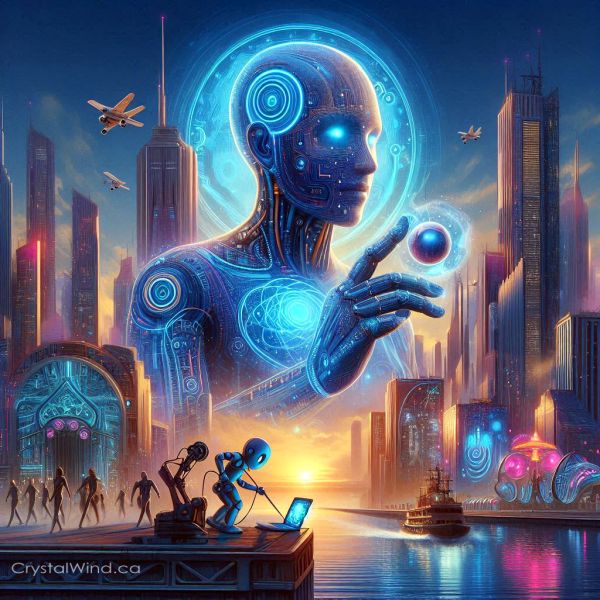AI Is Replacing Everything — Is Your Job Next?
- Details
- Written by Alue K. Loskotová
- Views: 8292

A wave of excitement about what artificial intelligence (AI) can do is sweeping the world. This excitement is often accompanied by panic, anger, anxiety, and calls to regulate, restrict, and censor AI, as society sees many paths to its misuse.
I understand all perspectives. I understand the artists who are angry that it seems no one needs them anymore because AI programs can create the needed image from a text prompt.
I myself reached a similar phase many years ago, long before AI existed. When I saw what could be achieved in Photoshop with just basic skills, I understood it was time to put away crayons and pencils because soon technology would surpass me, and no matter how much I painted and trained nonstop, I would not keep up. I humbly admit I’m no Da Vinci.
I thought I would only use crayons again with children, to practice fine motor skills. I completely gave up hopes of ever being a painter, drawer, or illustrator... Even though I illustrated my own books, I’m not a professional illustrator. Yet, I still draw portraits for people close to me. These moments are for relaxation and practice.
It surprised me that even now, when photorealistic beautiful images are just a click away, there are still people who get excited about my pencil drawings. Even though AI could generate a "pencil-style drawing" in two minutes that would take me three days. Maybe manual work without AI help is becoming more interesting and rare. Perhaps it’s like receiving a handwritten letter today. An AI pencil portrait would certainly be more perfect than mine, but it wouldn’t feel real. It would be digital, like everything else. That is probably the difference.
I’m glad I can do it because it still brings joy to people and opens doors to self-expression in many ways. But I no longer entertain the idea that it could bring me money or career growth because I know very well that I cannot compete with a computer and its perfect calculations.
How will art schools look in the future? Surely they will still exist, but I think their form will change a lot, with much more time and emphasis on digital art and 3D modeling rather than charcoal, canvas, or clay. I think future artists will be more programmers than craftsmen.
The controversy that AI takes artists’ jobs and opportunities has started, but this revolution is spreading into nearly all known fields. Is there anyone who is not complaining? The happiest are probably programmers—they have been enjoying this for some time. I don’t blame them.
Meanwhile, the public continues to find new ways to use these smart tools. For example, I was surprised by a woman on Threads who praised how ChatGPT acted as her free psychologist and helped her analyze manipulation and gaslighting in texts from her ex-partner. She asked if others use AI as their psychologist.
A psychologist? Wow! That’s exactly a profession I thought AI couldn’t replace because of the need for human contact and empathy. I thought these people would still have work in ten years, regardless of technological progress. Now I realize it might be different.
I imagine the world in ten or twenty years and wonder what kind of world we are heading into and preparing our children for. Which jobs will still have value? Which professions will AI not replace and which will survive alongside it? What is already obsolete and what is not? Is the panic justified or just a continuation of something that started long ago?
When I was in school, there was great controversy about mobile phones, which were banned and confiscated. Parents were furious and horrified about how much time we spent on computers. They cared more about that than about half of the kids being “emo.” They were angry that we played shooters and strategy games instead of running outside and hanging out. But the computer never argued with us. Sure, it sometimes crashed or overheated, but it was always there for us. Those kids who were banned from computers now repair them or program. Or they learned English well from computers. Or they run highly technical studios and make their own films.
I was even forbidden from writing. I honestly don’t know what would have happened if I’d obeyed because writing takes years to develop—not typing, but crafting sentences, expressing ideas, adding intonation through words so that texts don’t come off as irritating, misleading, ambiguous, or inappropriate. Choosing topics, filtering what is appropriate to write about—all that takes years of practice and doesn’t come naturally.
Our parents didn’t realize then that we were instinctively preparing for a future that is inevitable and different. The world they lived in was about to change. Computer literacy was essential for us. We played games and used mobiles because we felt we would need it—that it was the future.
Today, we fear self-checkout machines, thinking they take jobs away. We worry how many professionals ChatGPT can replace. We cling to the past and wish it stayed as we knew it because familiarity creates a sense of security. Even if that familiarity is unhealthy or disadvantageous, we prefer it. We are programmed to resist the unknown because the unknown carries potential risks. But by resisting, we lose chances to improve or move forward. Sometimes a leap into the unknown is the best thing we can do for ourselves.
Yesterday, AI explained something to me that would have required a programmer’s consultation. The day before, AI explained something that five doctors couldn’t. It gave me instructions I searched for in five books. Instead of hours and days of searching, I had it in half a minute. Is that bad? Should I complain? That would be against myself. In the remaining time, I could make jam, weed the garden, and smell the roses.
So, what professions will keep their value in the future? What do you think? Write your opinion in the comments.
In my opinion, it is anything connected with manual work. Something that cannot be programmed but must be done by hand or individually adapted for a client’s situation. Something without a universal answer. Something that requires an organic brain and its resonance.
Therefore, I believe crafts and services will still hold value, even in the distant future—like rehabilitation and masonry. Creating robots to dig trenches or operate excavators might be technically possible but would be very expensive. Or robots that evaluate your health and perform manual therapy or teach exercises? Very expensive, and unlikely to happen soon.
AI is also changing the media landscape. When I discovered that abroad, articles written by AI are published regularly, I was quite upset. (Because I used to read those and think they were great sources… but nope.) Once I understood the structure of a typical AI-written article, I began to recognize it almost everywhere. Then I understood why people say the internet is dying: content is created by computers, and soon it will be hard to find anything not written by AI.
I think it will end up like pencil drawing. General news articles may lose value, while personal confessions, diaries, experiences, and raw human outcries will gain value. These may not be perfect or reliable but will be authentic. You’ll feel that a real person wrote them with their own hands and mind, not asking AI to “write an article on topic X.”
Because even AI, I believe, is limited in ideas and originality. It only pulls from what the world already knows. When you search for pea growing tips, you find the same perfect guide on ten sites and a desperate gardener’s rant on the eleventh. You’re likely to read the rant with more interest.
Will blogs ever come back in fashion? I don’t know... maybe it will become a retro phenomenon. Aging millennials who still know how to write because they learned before AI wrote everything might become rare. Maybe this idea is completely off, or maybe it will be reality in twenty years. We’ll see. I’ve watched for ten years as trends shift away from long texts toward videos, podcasts, and short clips. It’s much easier to build a big social media following with videos than with text, as fewer people read nowadays. That’s my experience with YouTube: the same content is seen by 10-20 times more people when filmed. Colorful, fun videos are simply more entertaining, and people come online to relax. I won’t judge if it’s good or bad. It happens and will keep happening.
I think the right approach is to get on the train, not resist the revolution. Because we can’t stop it, and by falling behind, we only sabotage ourselves. Then, when we need it, we won’t catch up. That would be a shame.
Image and Translation by CrystalWind.ca
© 2025 CrystalWind.ca & Author | All Rights Reserved | No reproduction without permission | Awakening Souls Since 2008.
#CrystalWind #SpiritualJourney
Liked this article? Dive deeper into personal growth and wellness! Check out CrystalWind.ca for spiritual wisdom or explore AromaWorx.ca for natural well-being tips. Spread the positivity—share this with friends on their happiness journey!
Let’s Chat! Drop Your Thoughts Below! ![]()
Latest Articles

Imagine a world of inspiration and healing, free for all—made possible by YOU!
Donate Now—Ignite the Magic at CrystalWind.ca!

Epilepsy - Finding A Cure
Your donation can make a difference!
Help us find a cure – donate now!
Unlock Your Light: Join Lightworkers Worldwide on CrystalWind.ca!
Follow Us!
Featured This Month
Crystals for Virgo
As the warmth of summer begins to soften into the crispness of autumn, the Sun... Read more
Watermelon Tourmaline
Synonym: Rainbow Tourmaline The watermelon tourmaline is a rare variety t... Read more
Mabon Magic: Ideas For Fall Decoration And R…
Welcome (almost!) to Fall! We’re turning the Great Wheel once again, toward ... Read more
Sun in Virgo
An Overview of Sun Sign Characteristics for Virgo Virgo is guided by Mercur... Read more
Mabon in Modern Times: Fresh Takes on the Au…
The Mabon season begins somewhere around the 21st-22nd of September and cont... Read more
Virgo Mythology
The Virgo Myth In all of constellation mythology, few legends are as misund... Read more
Peridot: The Healer's Stone
Peridot has been used as a Power Stone for centuries. Peridot fosters emotio... Read more
Sweet Violet
Sweet Violet Faithfulness and modesty. “I will always be true to you.” Helps... Read more
The Vine: September 2nd - September 29th
The Autumnal Equinox ( Alban Elfed ) Celtic Symbol : The White Swan Read more































































































































































